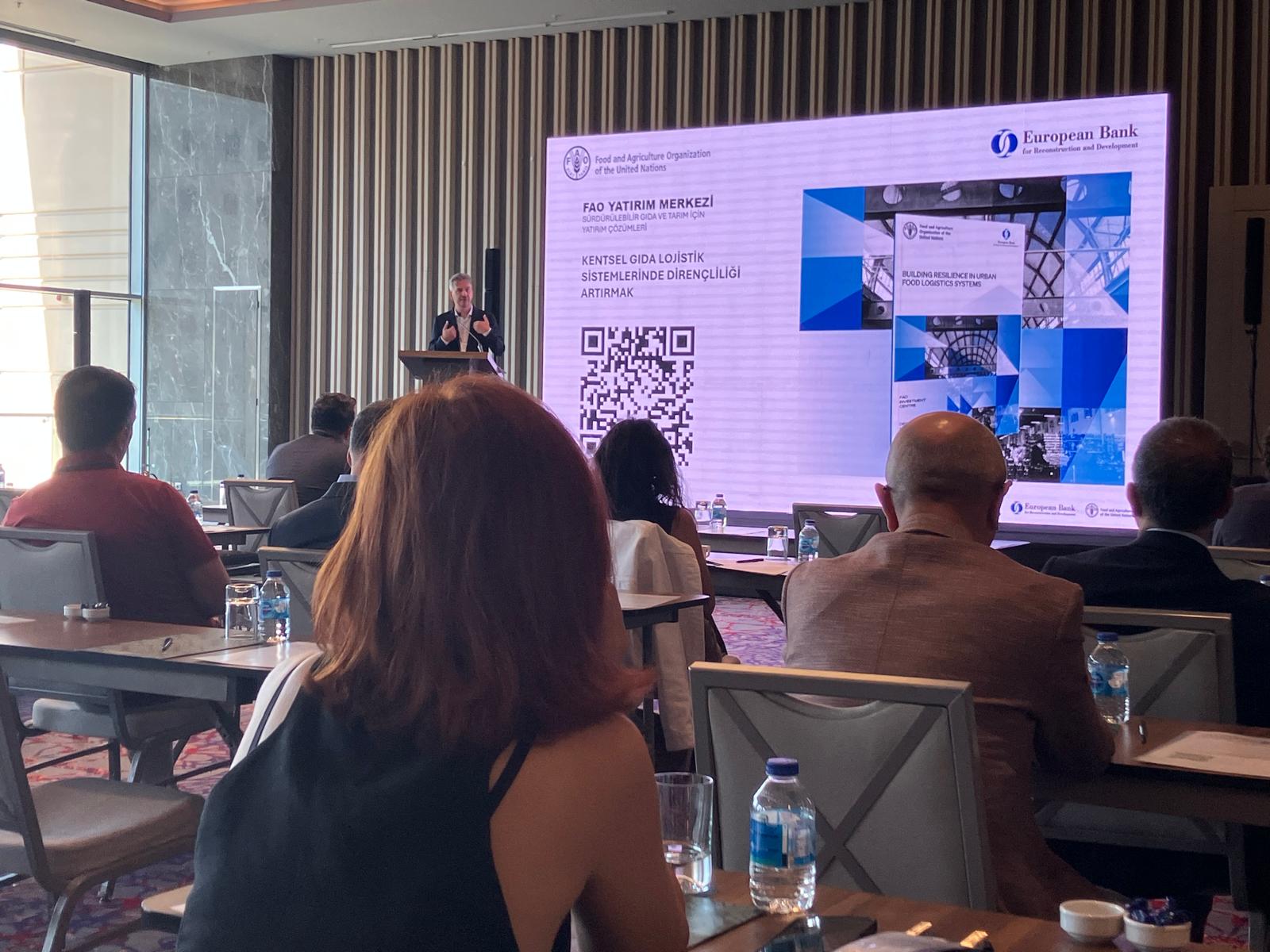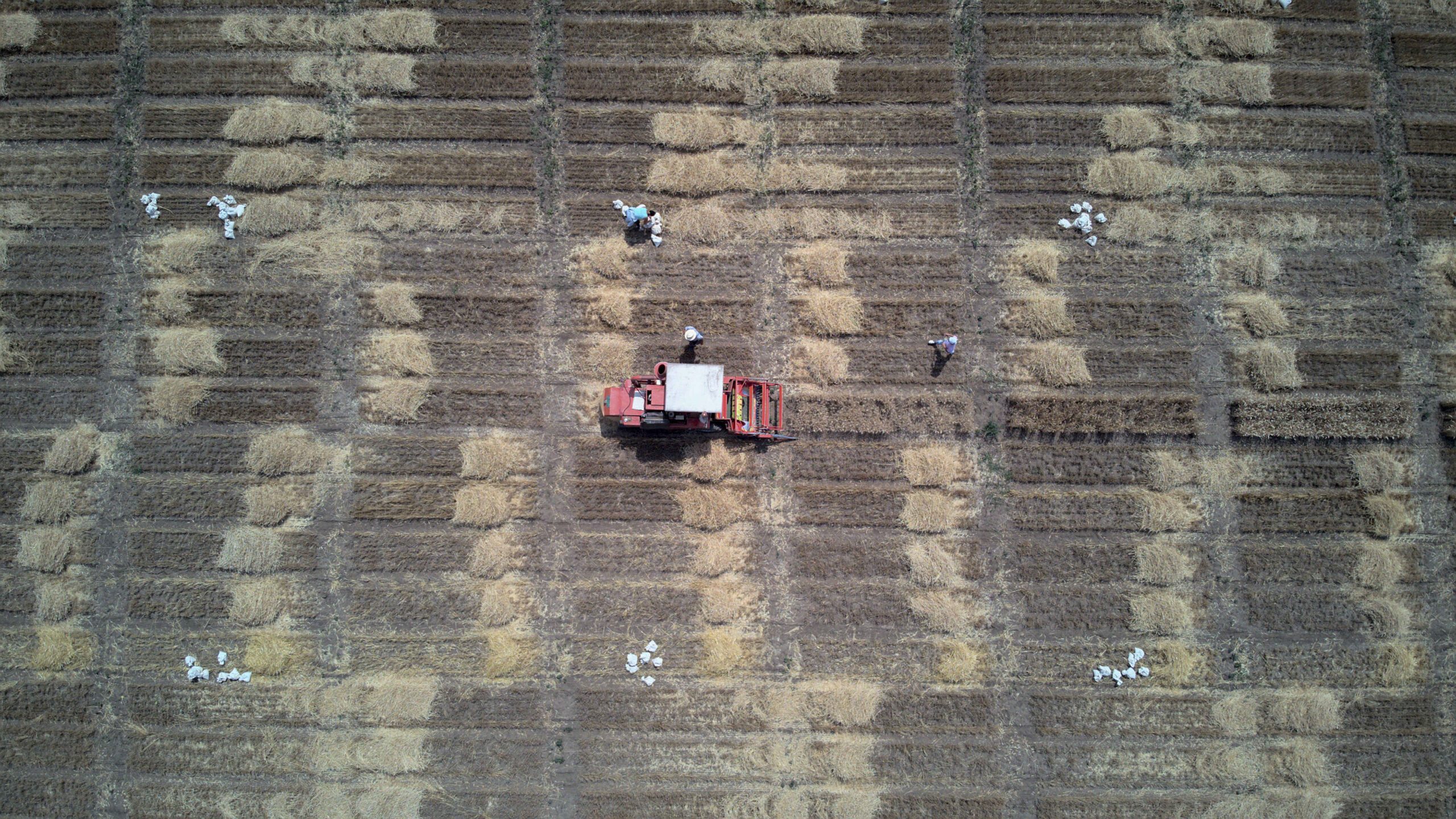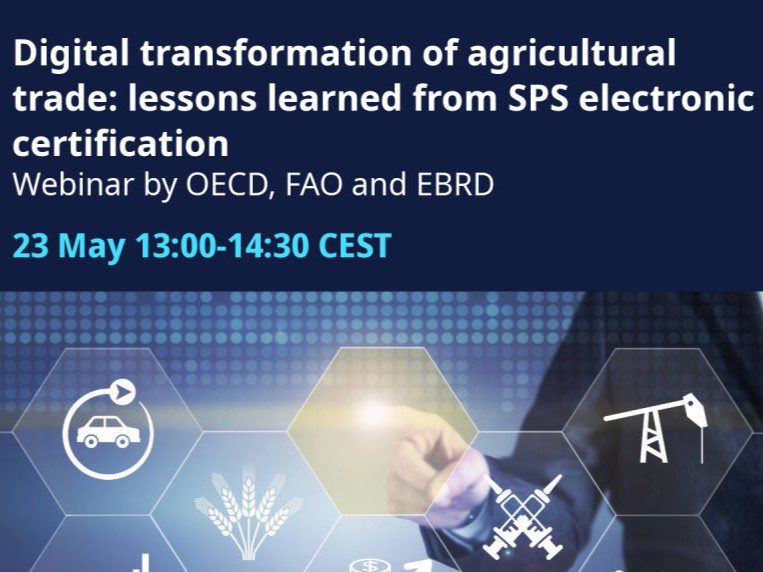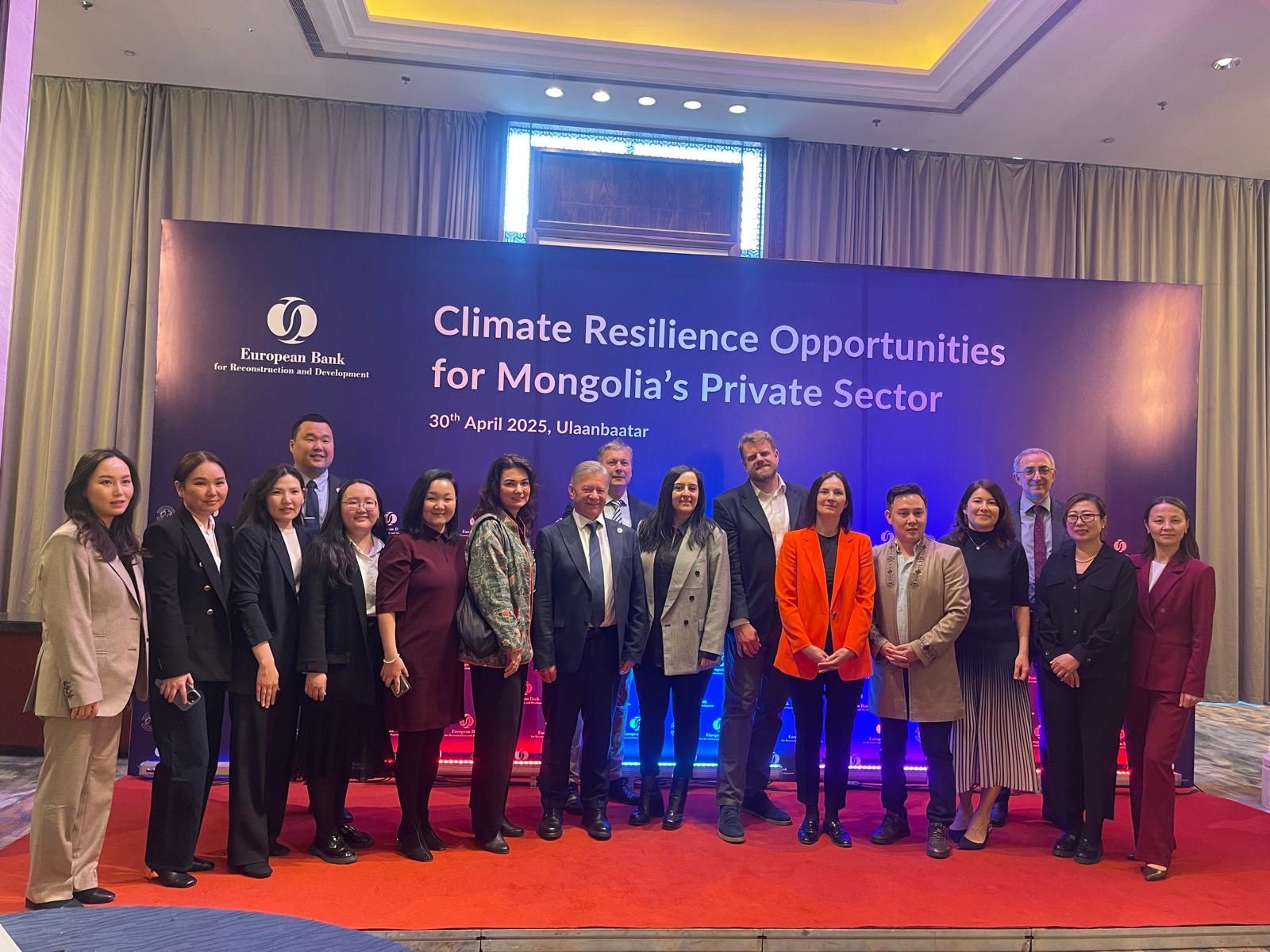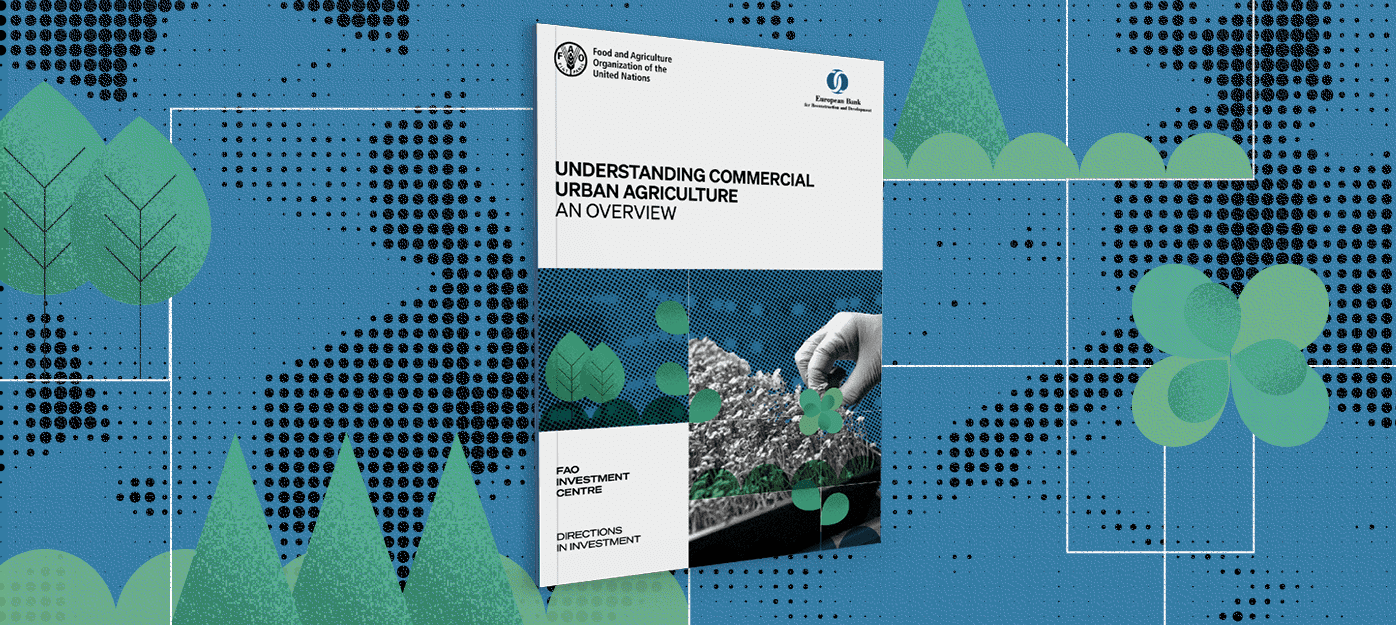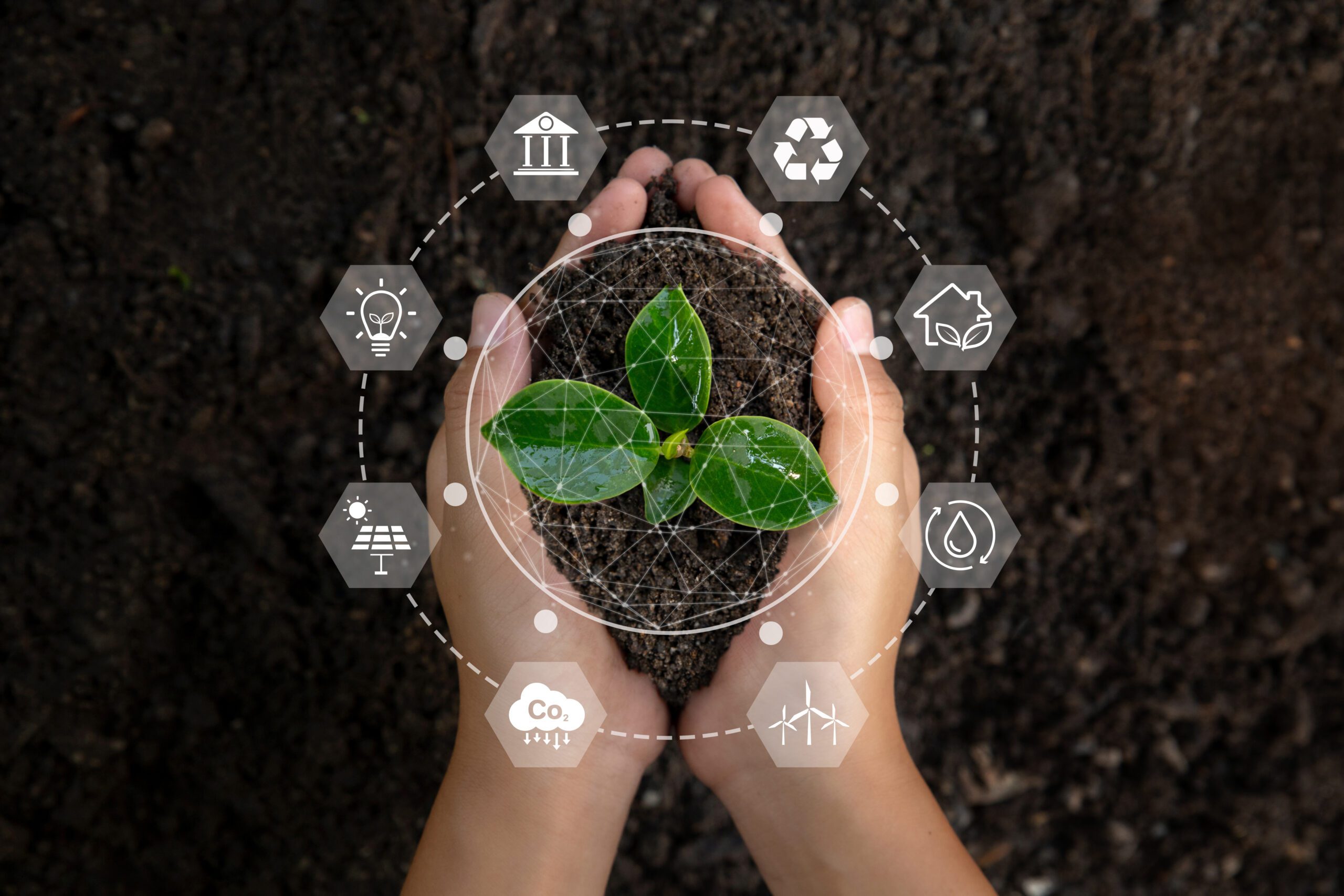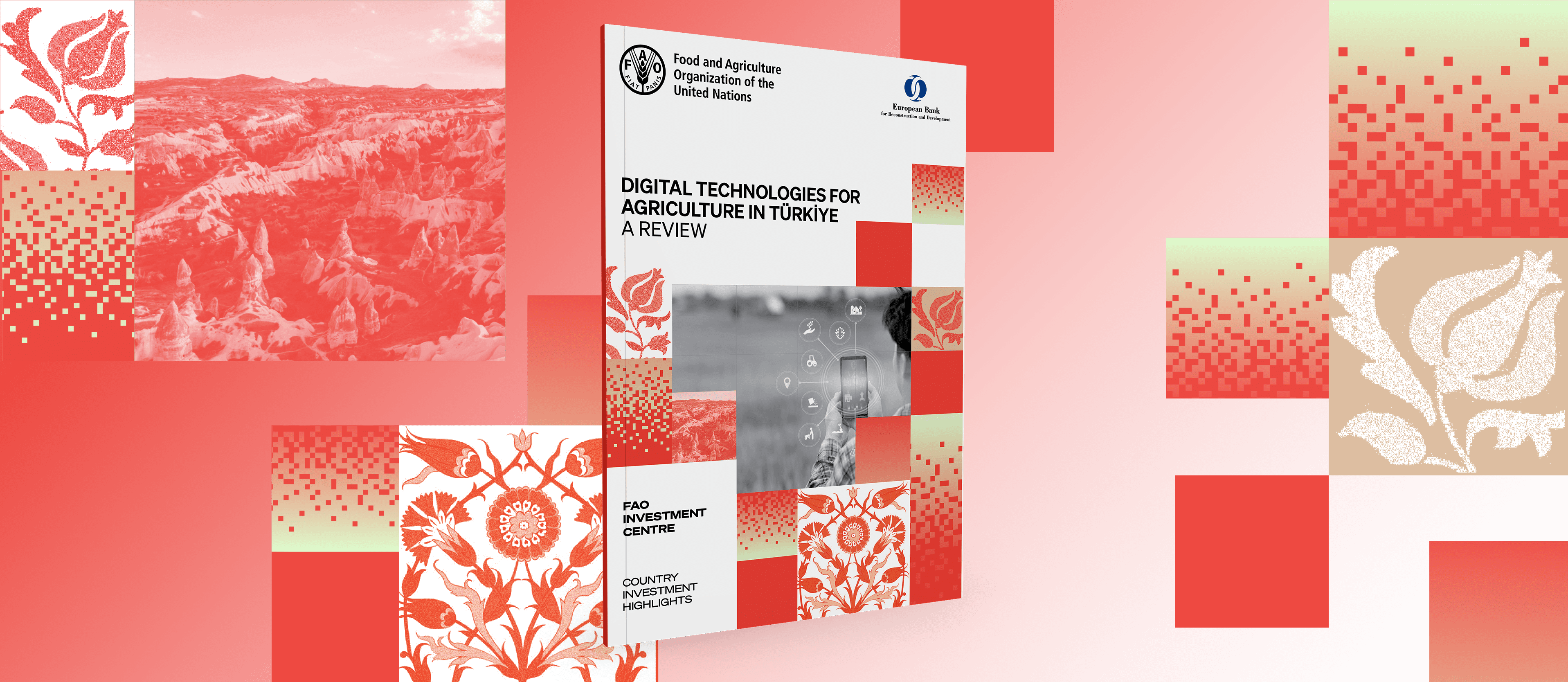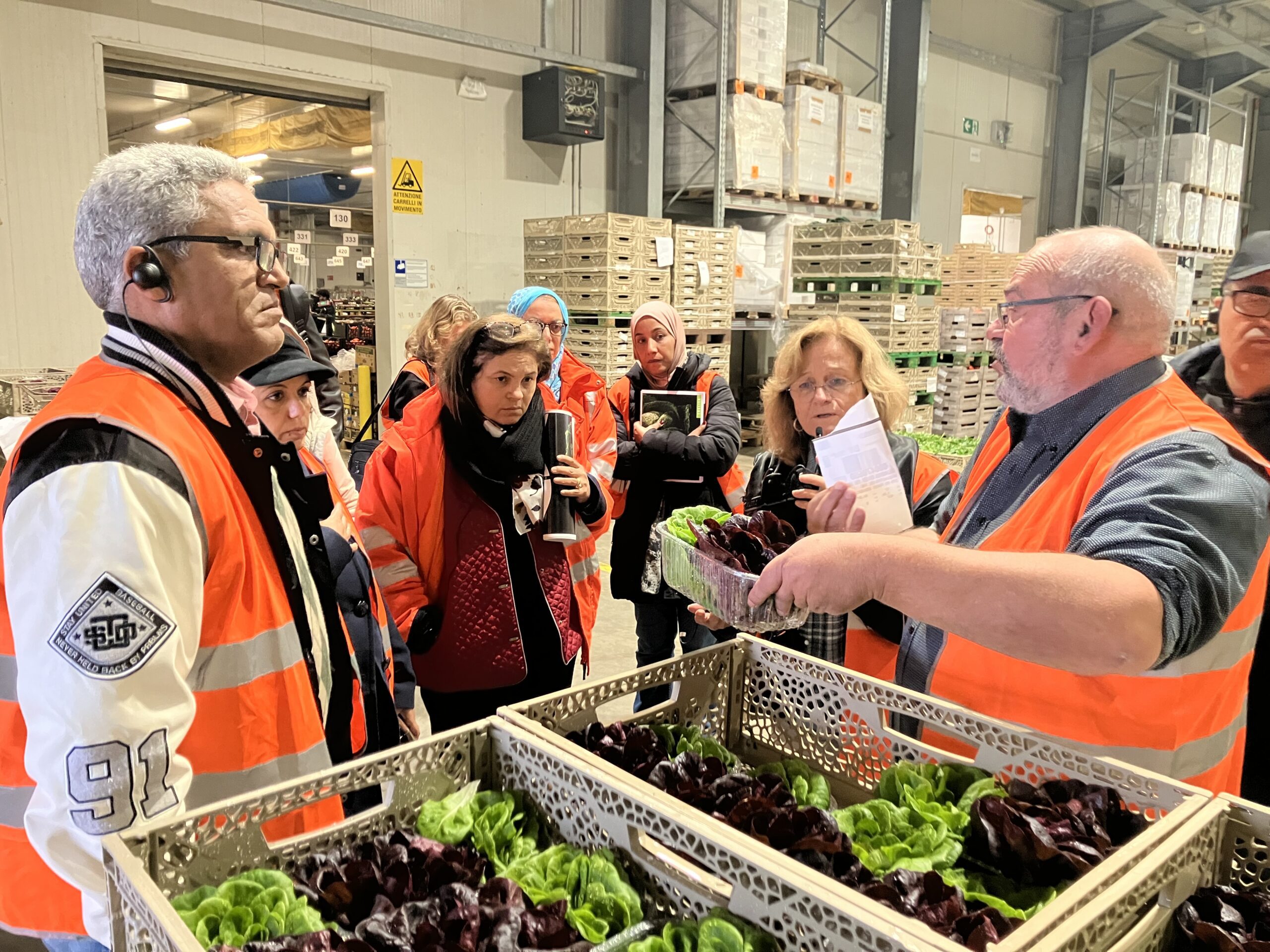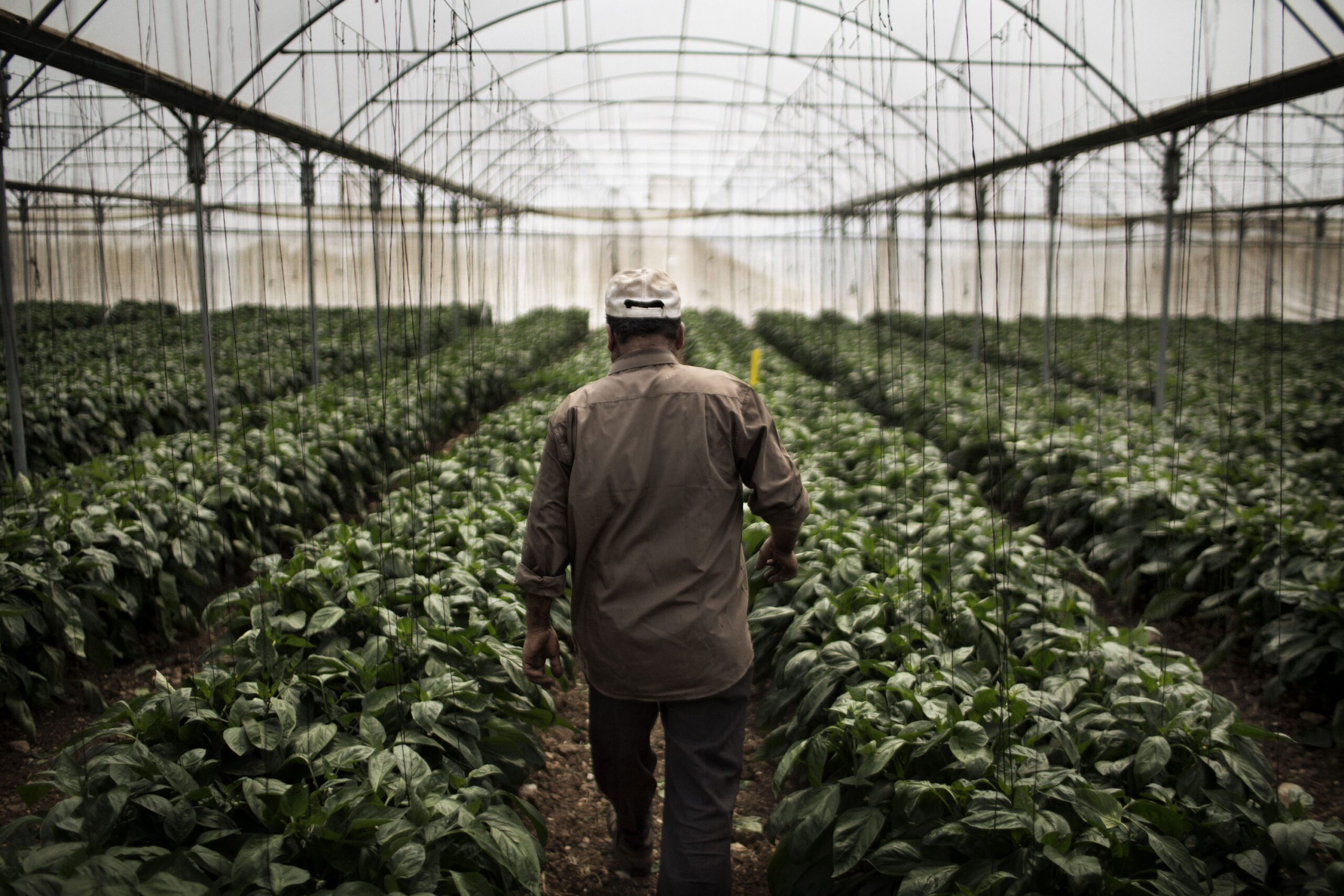Together for sustainable agrifood investment
Created by the EBRD and FAO, Agtivate is a platform designed to share experiences, trigger dialogue and innovate on sustainable agrifood investment in Eastern Europe, Central Asia, Türkiye and the Southern and Eastern Mediterranean.
News
Investing in more sustainable and resilient food logistics in Istanbul
19/06/2025
A high-level workshop held in Istanbul, co-organized by the European Bank for Reconstruction and Development (EBRD) and the FAO Investment Centre, focused on creating a ...
Serbia strengthens national expertise in carbon accounting for agrifood systems
23/05/2025
A training course on strategic carbon accounting was held in Belgrade, Serbia, on 13-14 May 2025, aimed at equipping experts and businesses with tools to ...
Save the date! New OECD, EBRD and FAO webinar on the digital transformation of agricultural trade
21/05/2025
Join us for a webinar on 23 May, 13:00-14:30 (CEST) where we will explore the benefits, opportunities and challenges of the digitalization of sanitary and ...
Climate Resilience Opportunities for Mongolia’s Private Sector
07/05/2025
Wednesday, 30 April 2025 – Ulaanbaatar, Mongolia The EBRD’s event held in Ulaanbaatar brought together more than 100 leaders from Mongolia’s private sector and financial ...
EBRD and FAO support solutions for sustainable agriculture in Kyrgyz Republic
03/04/2025
The EBRD and FAO have launched Greening Kyrgyzstan’s Economy: Know More, Act Better, Enhance Results to improve farmland management and food security in the Kyrgyz ...
Bringing phytosanitary certificates into the digital age
19/03/2025
Using electronic phytosanitary certificates (ePhytos) for exporting plants and plant products reduces trade costs, increases exporter margins and speeds up the delivery of fresh produce, ...
Urban agriculture is experiencing a growth spurt
22/01/2025
Commercial urban agriculture is transforming local vegetable supply chains and reducing reliance on global food markets. Over the past 20 years, advances in high-tech farming ...
Sharing knowledge, strengthening food security in MENA amongst Tunisian and Egyptian grain importers
22/01/2025
In November 2024, a transformative knowledge-exchange mission brought together Tunisian and Egyptian grain importers to share expertise on improving grain storage capacity and handling efficiency. ...
EBRD approves new food and agribusiness strategy
21/01/2025
The European Bank for Reconstruction and Development (EBRD) has approved its Food and Agribusiness Strategy 2025 (2025 Strategy). This comprehensive strategy sets a course for ...
Unlocking Türkiye’s AgTech potential
17/01/2025
The FAO Investment Centre, in collaboration with the European Bank for Reconstruction and Development (EBRD), has released a report titled “Digital Technologies for Agriculture in ...
Turning sustainable agritourism in Jordan into a reality
18/12/2024
EBRD/FAO end-of-project event recaps lessons and charts a way forward Jordan, with its rich cultural heritage, natural beauty and unique cuisine, is working towards establishing ...
Tunisian delegation draws inspiration from Italy’s agrologistics systems
13/12/2024
Getting top-quality fresh produce from farm to end consumer calls for efficient logistics and distribution systems A high-level Tunisian delegation recently participated in a four-day ...
Feeding our cities: How the COVID-19 pandemic reshaped the movement of food in urban areas
12/12/2024
The COVID-19 pandemic reshaped urban food distribution, accelerating trends like e-commerce, home delivery, and local sourcing, while also highlighting vulnerabilities in food logistics systems. A ...
EBRD supports expansion of APU Dairy
02/12/2024
APU Dairy is the second-largest domestic producer of dairy products in Mongolia The European Bank for Reconstruction and Development (EBRD) supports Mongolia’s agribusiness sector with ...
Why investing in climate-efficient agrifood systems infrastructure matters
26/11/2024
Is the global agrifood systems agenda missing out on an opportunity to guide sustainable public and private infrastructure investments? Today’s COP29 panel discussion led by ...
FAO’s Investment Centre celebrates 60 years of effective development partnerships
16/10/2024
Future work targets sustainable value chain development, decarbonization, digital agriculture and innovative finance among many other areas Rome – The Investment Centre of the Food and Agriculture Organization ...
From Baranja to the world
08/10/2024
A traditional Croatian sausage goes international with a boost from Protected Geographical Indication labels In recent years, traditional foods have gained recognition on the global ...
EBRD announces winners of EBRD AgVenture startup competition
04/10/2024
The EBRD announces three winners and three runners-up in its EBRD AgVenture startup competition Prizes include grants, mentorship, advisory support, and opportunities for networking and ...
EBRD Launches 2024 AgVenture Competition to Support Sustainable Agrifood Tech Startups
29/07/2024
The European Bank for Reconstruction and Development (EBRD) is excited to announce the launch of the EBRD AgVenture competition for 2024. This initiative aims to ...
FAO and EBRD mark new milestone in 27-year cooperation
23/07/2024
The European Bank for Reconstruction and Development (EBRD) and the Food and Agriculture Organization of the United Nations (FAO) signed their 200th project recently – a ...
Living and breathing gastronomic traditions in Serbia
18/06/2024
Ariljska malina, a plump and vibrantly coloured raspberry, stands as one of Serbia’s crown jewels. Revered as “red gold,” this local delicacy is cherished in ...
A chat with some of the innovators shaping Georgia’s tea industry
24/05/2024
Georgia’s once thriving tea industry – responsible for much of the tea consumed by the former Soviet Union until its collapse in the 1980s – ...
Exploring a resilient and sustainable future for food retail
21/05/2024
The Sustainable Food Retail Business Forum, convened by the European Bank for Reconstruction and Development (EBRD) in Warsaw on 16 April 2024, brought together industry ...
Accelerating Sustainable Climate-smart Agribusiness in Serbia and Uzbekistan
15/05/2024
A stakeholders’ meeting in Rome marked a pivotal step towards greater private sector engagement for climate-smart agrifood systems. It was held as part of a ...
Innovation is brewing in Georgia’s tea industry
10/05/2024
Today is International Tea Day! This popular drink – the second most consumed beverage after water – is an important source of economic growth, jobs ...
More per drop: Building resilience and adding value in Morocco’s Olive Oil Sector
24/04/2024
How best to pivot Morocco’s olive oil sector to adapt to the changing climate and leverage new opportunities in quality oil markets: two main topics ...
On the road to sustainable agritourism in Jordan
29/02/2024
Jordan’s delicious mix of cultural heritage and gastronomic delights is set to diversify and supplement the incomes of local food producers through investments that will ...
Helping minimize the misuse of antibiotics in farmed poultry in Ukraine
27/02/2024
A competition to find new ways to reduce antibiotic misuse in production animals has resulted in promising findings on how improved gut health in broiler ...
Joining forces to overcome Eastern Europe’s African Swine Fever threat
23/02/2024
21/02/2024 The urgency of a coordinated response to contain the threat of African Swine Fever was high on the agenda at the recent National Convention ...
EBRD charts direction of its new agribusiness sector strategy to meet tomorrow’s challenges
15/12/2023
FAO supported consultation with diverse stakeholders for insights Rome – Tackling the challenges that the world’s agrifood systems face today – from climate change and ...
Mitigating risks from pests in Egypt’s grain supplies
04/12/2023
A 3-day training course helped strengthen capacity for phytosanitary control and wireless sensor technologies in grain storage as part of broader efforts to reduce loss ...
Turning Tunisia’s magnificent olives into liquid gold
24/11/2023
Olive production dates back thousands of years and continues to play a vital role in Tunisia’s economy to this day, with olive groves covering about ...
Italian insights for stronger links between agricultural producers and tourism in Jordan
13/11/2023
On a five-day tour from 18-24 October, twelve Jordanian delegates travelled to different Italian regions to explore how to best connect local agricultural production to ...
Morocco’s fresh approach to Central-Eastern European horticultural trade
07/11/2023
A delegation of around twenty fruit and vegetable importers from Central and Eastern Europe visited Morocco in October 2023, with the mission to uncover burgeoning ...
Connecting the Dots for Open Innovation in Egypt’s Agrifood Sector
06/11/2023
Q&A with industry experts Diaa Rashwan, Regional General Manager of Innovations, Savola Foods, talked to us about why opening their company doors to external perspectives ...
Stimulating open innovation and investment in sustainable agrifood investment
06/11/2023
World Food Forum/Global Youth – 17 October 2023 How can young disruptive thinkers gain access to the resources they need to test their ideas in ...
Putting Tunisian Olive Oil on the International Map
04/11/2023
Investment Opportunities for Tunisian Olive Oil to branch into international export markets Since 2013, the Tunisian Government has been working to unlock the potential of ...
Expanding Egypt’s horticultural exports through improved food safety compliance
28/10/2023
Cairo, Egypt – Following a three-year project to help position Egyptian horticultural products on the global stage through improved compliance with international food safety standards, the ...
Finetuning prevention and early detection of African swine fever
15/10/2023
African swine fever, an infectious viral and highly lethal disease that kills pigs and wild boar, first appeared in the Balkans and the Republic of ...
Sowing the seeds of an agrobiodiverse tourist experience in Georgia
14/10/2023
Q&A with industry experts We asked Mariam Jorjadze, Director of Elkana, a biological farming association, if she could talk to us about agrotourism in Georgia ...
Uncorking the Western Balkans quality wine export market – an industry expert perspective
03/10/2023
Q&A with industry experts Frédéric Julia, International Wine Marketing Expert at Verthémis International, shares his perspectives and expertise on how the right investments, branding and ...
Moroccan olive oil players saw how Portuguese peers have built a thriving industry
09/08/2023
Morocco has taken steps in recent years to raise the profile of its olive oils – both at home and abroad – by improving quality ...
A study tour in Italy gives Jordanian and Palestinian olive oil producers food for thought
28/07/2023
A group of Palestinian and Jordanian olive producers and government representatives visited Apulia, Italy’s leading olive oil producing region, to see what it takes – ...
Livestock industry in Central Asia looks into digital solutions to build resilience
18/07/2023
Dairy and meat businesses in Central Asia, especially smaller ones, are being hit by multiple shocks – from the war in Ukraine, to droughts, to ...
From Italy to Georgia: regenerating rural communities with agritourism
26/06/2023
Exploring Georgia’s gastronomy offers tourists unique insights into the country and its culture. Enriching tourists’ experiences also has the potential to attract more visitors which ...
Opportunities and challenges of eating local
16/06/2023
Ahead of Sustainable Gastronomy Day (18 June), the European Bank for Reconstruction and Development (EBRD) and the Food and Agriculture Organization of the United Nations ...
A cut above – Pruning for resilient olive oil production in West Bank and Gaza Strip
13/06/2023
A training program, organized by the European Bank for Reconstruction and Development and the Food and Agriculture Organization on pruning and irrigation best practices began ...
The EBRD and FAO give quality wines of the Western Balkans a boost
25/05/2023
Why the Western Balkans economies are adding wine to their export basket Wine is gaining ground when it comes to the agrifood export menus of ...
Sharing innovations in irrigation and pruning to help Jordan’s olive trees thrive
03/03/2023
Technical training on good pruning and irrigation techniques targeted technicians and extension service agents of the Jordanian Ministry of Agriculture (MoA). Practical workshops for farmers ...
The COVID revolution in food e-commerce
01/03/2023
The COVID-19 pandemic established food e-commerce as a global phenomenon. Lockdowns and closures drove consumers online and led to a digital transformation, with profound impacts ...
Georgian red wheat bread revives tradition and sparks agritourism potential
01/02/2023
When Zaza Ivanidze and his wife, Tinatin Chilingarashvili, first baked bread using flour from the ancient and endangered, local red wheat variety, akhaltsikhe tsiteli doli, on ...
Modernizing food safety while preserving traditions in Serbia
10/01/2023
FAO and the European Bank for Reconstruction and Development help update food safety measures for smallholders’ traditional culinary products. Miloš Pajić follows a recipe over ...
The EBRD and FAO mark 25 years of cooperation with $5.5 million initiative to help face the global grain crisis
19/12/2022
Technical assistance targets food security in Egypt, Jordan, Lebanon, Morocco, and Tunisia as well as the West Bank and Gaza. With the launch of a ...
New online course targets a better and safer olive oil industry
25/11/2022
World Olive Tree Day is coming up and with it a chance to celebrate the importance of olive trees to people and the planet. It’s ...
“Open Innovation for better agribusiness” at the 2022 World Food Forum
02/11/2022
The world’s agrifood systems are being hit by multiple shocks – conflict, climate and public health crises – often at the same time. The issues ...
Strides towards sustainability for Jordan’s olive oil
05/10/2022
5 October 2022: Amman, Jordan. The European Bank for Reconstruction and Development (EBRD) and the Food and Agriculture Organization of the United Nations (FAO) in collaboration ...
Georgia is moving forward on sustainable agritourism ambitions
27/09/2022
Earlier this summer, renowned Georgian chef Guram Baghdoshvili prepared khinkali – a traditional Georgian meat-filled dumpling – on an Instagram Live hosted by the European Bank for Reconstruction and ...
Development banks can play an important role in the transformation to less wasteful food systems
19/09/2022
29 September is International Day of Awareness of Food Loss and Waste – an opportunity to raise awareness of practices and innovations to reduce food ...
War in Ukraine intensifies food security risks in the Southern and Eastern Mediterranean
08/09/2022
The report, developed by FAO and the European Bank for Reconstruction and Development (EBRD), focuses on the implications of the war in Ukraine on agrifood trade ...
New guidelines show how Montenegrin retailers can source locally
29/07/2022
While the COVID-19 pandemic disrupted trade and global food supply chains, it also created new options and preferences among consumers for local food products. This ...
Carbon neutrality: Utopia or the new green wave?
20/06/2022
New FAO/EBRD report shows pathways for decarbonizing agrifood systems. A new report from FAO and the European Bank for Reconstruction and Development (EBRD) provides a ...
Balkan region increases its African Swine Fever vigilance
01/06/2022
FAO and the EBRD held a virtual meeting on African Swine Fever (ASF) in the Balkans. This meeting concludes a series of three webinars organized ...
Cultivating the burgeoning tea industries in Georgia and Azerbaijan
20/05/2022
International Tea Day 2022 is a chance to focus on the impact the tea trade has on farmers, economies and the environment. Two reports on ...
FAO and EBRD hold dialogue on the olive oil sector in West Bank and Gaza Strip
16/05/2022
Stakeholders discuss opportunities to develop the sector. March 2022 – The European Bank for Reconstruction and Development (EBRD) and the Food and Agriculture Organization of the ...
Investment opportunities for climate-smart agrifood tech in Kazakhstan and the Kyrgyz Republic
22/04/2022
While food security is a renewed source of concern at the global level, the greening of agrifood systems remains a top priority to limit its ...
Boosting Egypt’s fruit and vegetable exports by improving food safety and quality
04/02/2022
EBRD and FAO organised training courses with farmers and exporters on pesticides management and microbiological contamination The Egyptian horticulture sector generated USD 2.2 billion in ...
Georgia eyes becoming a sustainable agritourism destination
17/12/2021
With its storied gastronomic traditions, rich cultural heritage and striking scenery from mountains to shores, Georgia has set its sights on becoming a top sustainable ...
Innovation is key to improving Tunisian olive oil sustainability and quality
09/12/2021
The European Bank for Reconstruction and Development (EBRD) and the Food and Agriculture Organization of the United Nations (FAO) held a webinar today to present ...
What is it that makes Olive oil good?
26/11/2021
How one project is boosting olive oil production in Morocco. Olive oil: rich in monounsaturated fats and antioxidants, it is a staple in many kitchens ...
Has COVID-19 forever changed the way we buy fresh food?
15/11/2021
New FAO and EBRD global study looks at trends in 9 cities Our food supply chains need to be able to respond to pressing demands, ...
New role for urban farming
10/11/2021
The European Bank for Reconstruction and Development (EBRD) and the Food and Agriculture Organization of the United Nations (FAO) today launched the first out of ...
Climate action in agribusiness could reduce emission by up to 7 per cent
05/11/2021
Joint EEBRD/FAO report values economic significance of potential savings of up to US$ 360 billion. Targeted action in agriculture could have a massive impact on ...
EBRD and FAO look at how cities are changing farming
30/08/2021
Modern urban agriculture represents an innovative response to the food requirements of an increasingly urban global population. But how do we reimagine the links between ...
Gaining a foothold in a crowded market
01/08/2021
FAO and EBRD help southern and eastern Mediterranean countries raise the profile of their olive oils, boosted by a new agreement between FAO and the ...
Sustainability drives trends in trade for Moroccan fresh produce
19/07/2021
Fruit and vegetable production and exports are an important sector for Morocco. The Food and Agriculture Organization of the United Nations (FAO) and the European ...
Balkan bytes: How digital agri-entrepreneurship is changing a country
14/06/2021
With FAO and EBRD support, a young social activist is wiring Montenegro’s rural heartland In March of 2021, a Montenegrin cow became the first known ...
Flexible food safety bylaws an opportunity for small-scale Serbian producers World Food Safety Day
07/06/2021
Keeping food safe from farm to plate is everyone’s business. In Serbia, new flexible food safety bylaws are making it easier for small-scale producers to ...
Apps and animations improve traditional dairy production in Kazakhstan
01/06/2021
FAO’s Collect Mobile app and Smart Milk digital portal are boosting farmers’ livelihoods. Within the vast borders of Kazakhstan, the world’s ninth largest country, about ...
Potential brewing for Azerbaijani and Georgian tea industries
20/05/2021
Azerbaijani and Georgian teas took centre stage during an online celebration on the eve of the second International Tea Day. The Food and Agriculture Organization ...
Serbia moves closer to global grain market integration
16/03/2021
Serbia, the world’s 7th largest exporter of maize Serbia to join major grain exporting and importing countries in the International Grains Council EBRD/FAO committed to open ...
Direct routes to Eastern Europe for Moroccan fruits and vegetables
28/01/2021
Twenty-eight Moroccan fruit and vegetable producers and traders met with representatives from the three leading logistics companies in Poland on 28 January to explore ways ...
Georgian vegetable producers prove that kindness is contagious
09/09/2020
A kind gesture by entrepreneur and food hero, Keti, helps other women through the COVID-19 pandemic. Getting the idea to grow herbs from an FAO-EBRD-organized ...
EBRD and FAO support Serbia’s efforts to increase irrigation
24/07/2020
New national strategy and action plan in the works. Government of Serbia, EBRD and FAO to support country’s agriculture New approach to increase productivity of ...
What’s in a name? Or better yet, what’s in a cheese?
18/06/2020
Geographical Indications help celebrate countries’ rich food heritage. Geographical Indications (GI) create pathways to sustainable development. GIs are a way to preserve local know-how, traditional ...
Project corner
These are some of past and ongoing projects under the joint EBRD/FAO cooperation
Serbia and Uzbekistan are stepping up action to meet global climate change agreements including in their agrifood sectors through decarbonization, adaptation to future climate scenarios and through greater private sector investment and engagement.
This project aims to contribute to the transformation of the Mongolia's dairy sector towards climate resilience and reduced environmental impact. To do so, the project will build the capacity of the Dairy Development Board to foster climate-smart practices and conduct greenhouse gas (GHG) emissions accounting.
The project aims to trigger a green transformation in farmland planning and use through a national evidence-based decision-support system. Specifically, a GIS monitoring system will be developed and made available to the private sector as a public good. This system will support decision-making regarding agricultural practices, increasing yields while reducing environmental impacts.
The Water-Energy-Land Nexus is a concept highlighting the interdependence of water, energy and land, applied in this Programme to the agrifood sector. These relationships in the agrifood sector are complicated, necessitating a comprehensive approach to finding solutions for the optimal utilization of these vital resources across the water, energy and food & land nexus.
- agribusiness, agriculture, blended financing, Central Asia, climate change mitigation and adaptation, cross-sectoral cooperation, energy-water-land nexus, food, Food security, innovative finance, investments, low-carbon, population growth, Private Sector, regional cooperation, Resilience, Sustainable Production
In the context of supply disruptions due to the ongoing conflict in Ukraine, this project is supporting Tunisia to improve the efficiency of its grain sector through greater private sector participation, improving its resilience to market shocks.
Tunisia is boosting the quality and profile of its olive oil through an initiative that is also helping small and medium producers and processors access lucrative export markets.
Bulgaria, Moldova, Romania, Serbia and Ukraine are working to manage the risks of transboundary animal diseases which devastate wild and domestic animal populations threatening the food security and livelihoods of millions of people.
This EBRD and FAO project focuses on the need for a new generation of infrastructure to serve agrifood systems that supports progress towards improved economic and financial efficiency, climate resilience, lower stress on natural resources and reduced emissions over their lifecycle.
Egypt, Jordan, Lebanon, Morocco, Tunisia and the West Bank and Gaza are improving market transparency and policies to strengthen food resilience against supply disruptions and price spikes, such as those resulting from the ongoing war in Ukraine.
Better management of natural resources is set to help Egypt, Gaza, Jordan, Lebanon, Morocco, Tunisia and the West Bank diversify and boost food production.
Egypt, Jordan Lebanon, Morocco, Tunisia, and the West Bank and Gaza broadening their supply base as part of a strategy for greater stability for imported food security crops like grain.
Digital innovations and capacity building are driving change in milk sector, connecting smallholders to processors to boost raw milk quality, steady supplies, and reduce inefficiencies.
Morocco’s olive oil industry is becoming more competitive globally with better quality products helping to increase incomes for farmers and producers.
The EBRD and FAO have embarked on a comprehensive study to assess trends, challenges and opportunities for decarbonizing agrifood systems and help countries achieve multiple Sustainable Development Goals.
As digital innovations bring new opportunities for many countries to trade safely and efficiently across international borders, the EBRD and FAO are providing the support they need to leave the paper trail behind.
The EBRD and FAO are working with partners in Georgia to strengthen its agritourism industry and create more jobs in rural areas, protect livelihoods and culinary traditions, and preserve local biodiversity.
Working closely with public and private sector partners in Bosnia and Herzegovina, Montenegro, North Macedonia, Serbia and Ukraine are building on their long-established export markets for grains and cereals by offering an extra serving of fresh fruit, with a side order of honey and wine.
Montenegro and Serbia are improving quality standards and labelling for a range of quality products that will promote sustainable agrifood value chains, increase market competitiveness and tap into tourism markets.
Georgia, Moldova, Tajikistan and Uzbekistan are set to capitalize on increased global consumer demand for fruit and vegetables through this project to build capacity, investment and market links to boost their horticultural exports.
Disruptions during COVID-19 highlighted the urgent need to build resilience in food supply chains. Short value chains can reduce risks, boost smallholder incomes, and meet consumer demand for locally sourced fresh quality produce.
Climate-smart solutions can reduce production risks and boost trade and investment. An EBRD and FAO projectexplores the green fruit and vegetable production in Georgia, Moldova, Ukraine and Uzbekistan.
Improving tea quality while anticipating climate risks could change the fortunes of two ancient tea-producing industries according to new reports by the EBRD and FAO.
Private agribusiness partners working with the EBRD and FAO are creating opportunities for young entrepreneurs to transform value chains across the Middle East and North Africa (MENA) region and Türkiye to be more sustainable and inclusive.
The EBRD and FAO have visited seven cities as part of a project to understand how the COVID-19 pandemic has shaped how fresh foods are distributed and bought, paving the way for food systems that are more flexible and resilient.
The EBRD and FAO are working with the government in Serbia to enhance and upgrade the country’s irrigation systems as part of efforts to protect and increase its agricultural productivity, environmental sustainability and climate change resilience.
As the world’s urban population is set to increase to almost 70 percent by 2050, the EBRD and FAO look to more than 250 companies in over 85 countries to understand the new wave of commercial urban farming to guide investments that link technology and innovation with food, nature and people.
Identifying priority investment areas for olive oil production in the West Bank and Gaza will help diversify and expand its export markets for this resilient high-value crop.
Increasing export markets for Jordan’s olive oil will generate income for farmers and producers and boost resilience to increasing water scarcity and erratic weather.
Development banks can play an important role in the transformation to less wasteful food systems. A new brief sets out how.
The EBRD and FAO are working with the government in Morocco to increase deliveries of its high-value horticultural products to both developed and prospective markets while anticipating sustainability risks posed by the expansion of key fruit and vegetable value chains in the country.
The EBRD and FAO are working in Jordan to strengthen links between local agricultural producers, traditional foods and the tourism industry, in a move that could serve up benefits for all.
Registering and promoting the Geographical Indication for Turkish pine honey could see increased exports, improved supply chain efficiency, revitalized local economies, protected biodiversity and a treat for honey connoisseurs.
With the support of the EBRD and FAO, Egyptian exporters are strengthening their capacities to increase access to and stay competitive in high-value export markets for its delicious and nutritious fruits and vegetables.
To ensure that wheat supplies flow in and pests and diseases stay out, the National Food Safety Authority (NFSA) is addressing inefficiencies along Egypt’s grain value chains with the support of the EBRD, FAO and public-private dialogues.
About us
The Agtivate hub builds on EBRD’s agribusiness investment experience, FAO’s technical knowledge and policy facilitation skills, but also on the joint experience of the two institutions to make private agrifood investment greener, more inclusive and more resilient.
EBRD/FAO COOPERATION
IN ACTION SINCE 1997
Technical Assistance
0
Projects
Involved
0
Countries
